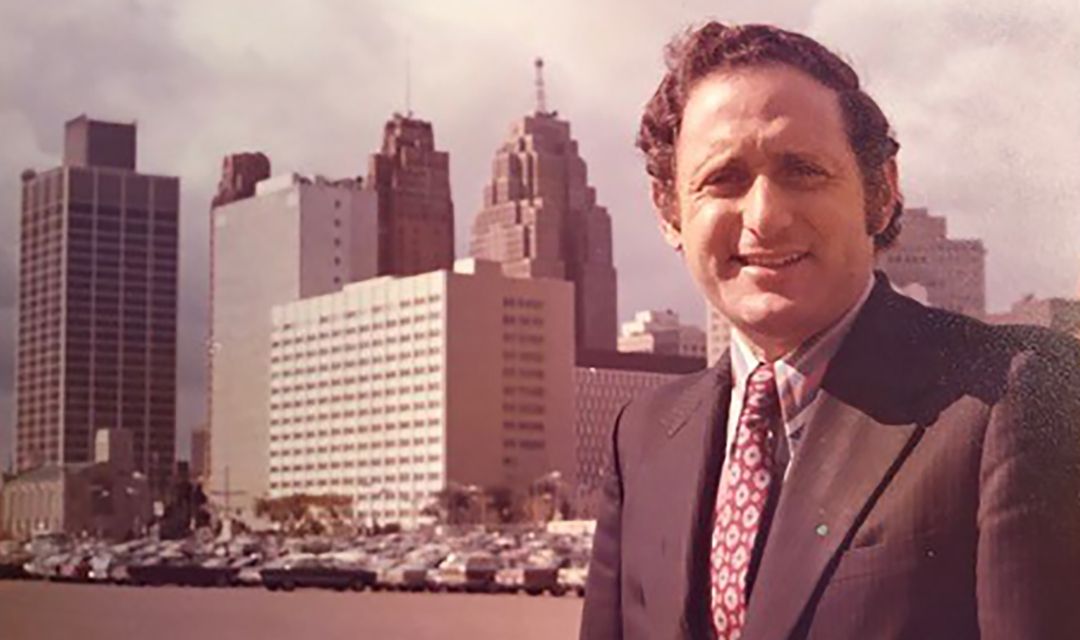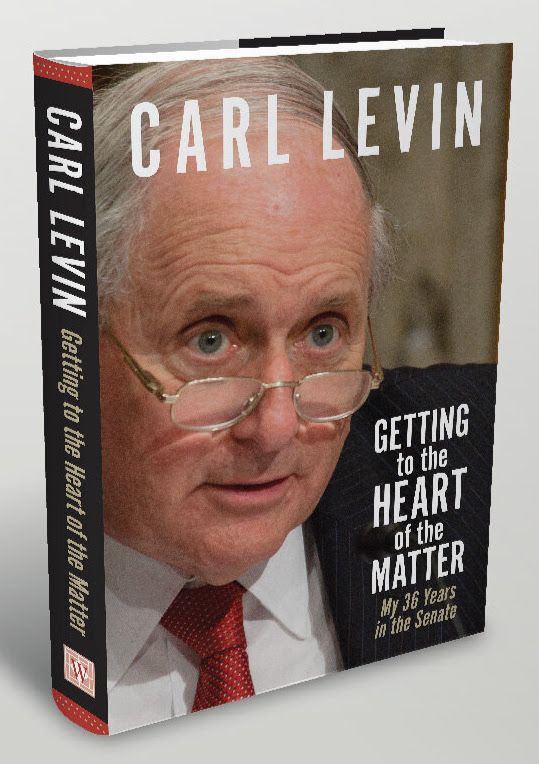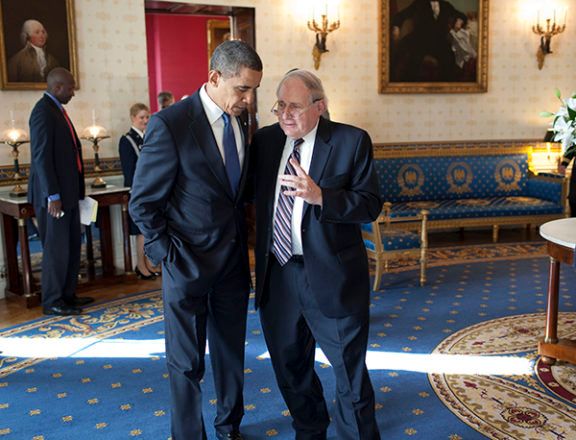Origins
It's no understatement to say that public service and politics are in my genes. My father, Saul, a lawyer and strong Democrat, served on the Michigan Corrections Commission. His brother, Theodore, my Uncle Ted, was a federal judge, and his son, Charles, was a state supreme court justice. My cousin, Avern Cohn, was a federal district judge for over forty years. My mother's brother, David Levinson, served for thirty-five years on the Oakland County Michigan Board of Supervisors. And, of course, my brother, Sandy, served in the U.S. House of Representatives for thirty six years. Upon Sandy's retirement, his terrific son Andy followed in Sandy's footsteps and, at the time of this writing, represents the same congressional district.
Our family's love affair with America began when my four grandparents immigrated to the United States in the late 1800s from Lithuania, Poland, Russia, and Moldava, some of the places from which Jews fled to escape persecution. My mother's father, Morris Levinson, and my grandmother, Gittelle, found their way to Birmingham, Michigan, where they were the only Jews in the 1890s. Morris started as a peddler, going with a horse and buggy to farms in northern Oakland County to sell spools of thread, needles, and other small household items. They saved their pennies and bought property at the town's main intersection, Woodward Avenue and Maple Road, where they opened a little store that eventually grew into four storefronts.
My mother, Bess, was born at home in 1898. She was a strong woman, very independent, and ahead of her time in many ways. She graduated from the University of Michigan long before women attended in large numbers. And she volunteered in many organizations, including Hadassah, the American Jew ish women's volunteer organization, which at the time advocated for a Jewish homeland and became famous for, among other things, the Hadassah Research Hospital in Jerusalem, which treats people of all religions and races and supports the education of poor children in Israel and around the world.
My father's parents, Joseph and Ida, had eight children. My uncle Ted was the oldest, and next oldest was my father, Saul, born in Chicago where Grandpa Joe worked in a cigar factory. When Joe was fired for trying to organize a union, he later landed a job as a foreman in a cigar factory in London, Ontario, part of the tobacco belt on Lake Erie's north shore. To help their family financially, Ted and Saul as teenagers worked the trains between London, Ontario, and Port Huron, Michigan, selling candy and gum to passengers. In 1913 the family moved to Detroit.
After high school, my father and Ted both attended the University of Detroit School of Law at a time when you didn't need a bachelor's degree to study law. They got their law degrees and opened an office in Detroit. They mainly represented immigrants, usually for free, but when the new arrivals later opened small businesses, they hired lawyers they trusted - like the Levin brothers - to handle their legal work. My father and Uncle Ted were recognized not only for their legal acumen but also for their ethics and passion for justice. In 1946, President Harry Truman nominated Uncle Ted to be a judge on the United States District Court for the Eastern District of Michigan where he served until his death in 1970, including as chief judge from 1959 to 1967.
My father was a strong liberal. He represented migrant farm workers pro bono. He picked up the Spanish language and taught it to U.S. Navy flyers during World War II. He frequently traveled to Mexico, including once, he told us, with the author John Steinbeck. Honduras named him its honorary Consul General in Detroit. He served for years on the Michigan Corrections Commission where he was considered an expert in penology, caring about prison conditions and corresponding with several inmates. He was widely known and respected for his gentle nature and was beloved by a host of nieces and nephews.
I was born in Detroit in 1934, three years behind my brother, Sandy, and six years behind our sister, Hannah. After 1940 we lived in a house on Boston Boulevard, part of the well-established Boston-Edison neighborhood, and the three of us attended Roosevelt Elementary, Durfee Intermediate, and Central High School, all excellent public schools. We had the benefits of loving parents; a warm, extended family; a middle-class lifestyle; and the freedom to explore and grow in a city we loved.
While our immediate neighborhood wasn't Jewish, our family were proud Jews. As a four-year-old Jewish kid, I remember the exhilaration of my family when Joe Louis knocked out Max Schmeling, who, though not a Nazi, was for many the symbol of Hitler's racist regime. As an eleven-year-old, I remember how, on a Sunday afternoon with my brother's and my ears glued to the radio, we shrieked and hollered when Hank Greenberg, the Jewish community's pride and joy, recently back from the war, hit the pennant-winning home run for the Detroit Tigers in the last game of the season. And as a teenager, as the full impact of the Holocaust and its horrors unfolded, I understood why the Jewish people, my people, needed a homeland, a place where the Jewish survivors in Europe could find safety and where Jews forever could find refuge when danger appeared.
I remember how my family celebrated when President Harry Truman recognized Israel. I also remember the gratitude that my parents instilled in my sister, my brother, and me for living in America as a haven for minorities and refugees. As children of immigrants, our parents taught us to appreciate the sacrifices that so many immigrants make and the risks they take to reach our shores. They told us to never complain about paying taxes-a small price to pay, they said, for living in America.
As a kid I had a group of friends we called "the gang," many of whom became lifelong friends, and despite our differences in age, Sandy included "my" group with "his" group in the games we played. The gang included Dick Bernstein, Norman Bolton, Mel Fishman, Eugene Gordon, Bob Marans, Merrill Miller, Dennis Ormond, Fritzi Roth, Fred Shulak, Arthur Vander, Ben Wasserman, Joe Weiss, and Sheldon Wigod.
Sandy and I were extremely close buddies all our lives. Almost every summer we went to camp together. During the last two summers of World War II, in 1944 and 1945, we went to Camp Cobbossee in Maine, a great sports camp for boys. I was ten and Sandy was not quite thirteen. We played a lot of baseball at that camp, but we also picked beans two or three afternoons a week to assist in the war effort. With so many off to war or working in jobs those in the military left behind, even we campers needed to help. I'm sure our parents wondered why they spent their money sending us to camp to pick beans, but they also knew it made us feel part of something bigger than ourselves. That message drove a lot of what they taught us growing up, and it was a message we carried throughout our lives.
We helped with the war effort at home, too. We collected tin foil from gum wrappers and cigarette packs dropped in the streets. I remember peeling the foil off the paper wrappers and wadding it into little balls to bring to school. All the homerooms did the same. We felt we were doing our bit to help win the war. We also collected tin cans. My job at home was to take off the ends of the cans, flatten them, and box them up to take to school. I often talk about the value of every one pitching in during wartime as we did in World War II. That sense of common purpose, of people of every age and background doing what they can, sacrificing for the good of the country, is something we've sorely missed of late.
My family often discussed politics at dinner. My parents were strong supporters of Franklin Roosevelt, and my dad was involved in a number of political campaigns, including that of Congressman John Dingell Sr. Our family ate dinner together, and we always waited for my father to get home no matter how late he was. During dinner my parents asked for our opinions, making us feel an equal part of the discussion. They carried that spirit into family life in general, scrupulously playing no favorites among their kids or grandkids. No doubt that helped shape my own deeply held belief in the equality of all people.
Their willingness to listen to us was particularly meaningful when President Harry Truman was running for election in 1948. Dad supported Henry Wallace, FDR's third vice president who ran as the Progressive Party's candidate. Sandy and I argued that a vote for Wallace would help Republican Thomas Dewey. Despite our pleas, Dad left for work election day vowing to vote for Wallace. When he came home from work that evening and we asked him whom he voted for, his answer was a satisfying, "Aw, I voted for Truman!"
Once Sandy got his driver's license, we took a number of trips together. We drove to Lake of the Clouds in the Upper Peninsula to fish, but we didn't do much fishing. We liked to read so we'd tie our fishing rods to the boat and read books while we waited for some action, but we never got a bite. Later we took a road trip to Mexico with his buddy Bill Broder in Bill's mother's car. The car took a beating from fording streams and driving up mountains on dirt roads and came back significantly worse for the wear.
We also worked to make money for college and law school. I worked in three Detroit auto plants: DeSoto, Lyon Wheel Cover, and the Ford Tractor Plant in Highland Park. At DeSoto I worked in the "white body department," so called because the cars weren't painted yet. My job was to be inside the car's shell when strong guys would lift the left-side doors and hold them in place while I tightened the bolts. It was noisy — particularly if a door didn't fit quite right and the guys on the outside had to use their rubber mallets to pound it into place. Bam! Bam! Bam! I was also told to take care of just the specific bolts on the left-side door hinges — and nothing else. If I saw a problem with any other part, it wasn't my responsibility to report it or fix it even if that made good sense. That culture would haunt the auto industry when Detroit started to face global competition.
Sandy and I also drove cabs one summer and had a friendly competition as to who would make more money. Sandy always made more on the fares because he drove faster and thus got more trips. But I got more tips because I was younger and people probably felt they wanted to help this young guy. Sandy got involved in politics early. In high school he was president of his class and an activist. At the University of Chicago, he was president of the student government and active in the National Student Association and Students for Democratic Action, the student component of the Americans for Democratic Action.
My first campaign came when I ran for treasurer of my high school class. I had posters with pictures of a piece of matzo that said, "This is what happens to bread without Levin." I won that election and never lost an election after that, although I came pretty close a few times.
Nu?Detroit members receive 50% off Getting to the Heart of the Matter and every other book published by Wayne State University Press.



Comments
Sign in or become a Nu?Detroit member to join the conversation.
Just enter your email below to get a log in link.